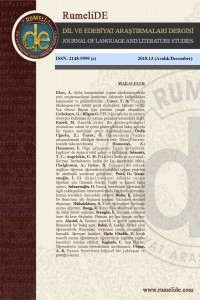Abstract
Bu çalışmanın amacı,
görsel kavram haritalamayı öğretmek ve öğrencilerin yazma konusundaki
tutumlarını ve sınav yazmalarının kalitesini geliştirmek için bir müfredat
geliştirmektir. Öğrencilerin çalışma belleği ve dil becerilerini geliştirmek ve
az miktarda veri toplamak için görsel kelime ve görüntü bağlantıları kullandık.
Çalışma, bir İngilizce hazırlık programının yaz modülü sırasında gerçekleşti ve
gönüllü oldu. İngilizce hazırlık eğitimi programına devam eden öğrenciler için
yaz okuluna atölye ve metodoloji geliştirdik. Öğrencilerin materyallerin tutum
ve bilgilerini ve programın etkinliğini tespit etmek için atölye
çalışmalarından sonra öğrenciler ve atölye eğitmenleri ile anketler ve kişisel
görüşmeler yaptık. Araştırma ortakları, çalıştayların notlarını ve kayıtlarını
aldı. Kurs sonu sınavları, nicel veriler için referans alınmış, ancak
çalıştaylar gönüllü olmuştur. Çalıştaylar, ders modülüne çevre birimleriydi ve
öğrencilerin ders yükünden ve final sınavından sorumlu oldukları belirli
görevleri hedeflerken, mümkün olduğunca öğrencinin ağır iş yüküne rahat ve
yardımsever olmayı hedefliyordu. Daha fazla araştırmaya ihtiyaç vardır, ancak
sınırlı veriler, öğrencinin zihin haritalama tekniklerini içermesi ve final
sınavı yazma sınavının taleplerini tamamlama yetenekleri arasında bir ilişki
olduğunu göstermektedir.
Keywords
References
- Al-Zyoud, A. A., Al Jamal, D., & Baniabdelrahman, A. (2017). Mind Mapping and Students' Writing Performance. Buzan, T. (1971). Speed reading (Ch 11) London: David & Charles Buzan, T., & Buzan, B. (1993). The mind map book: How to use radiant thinking to maximize your brain's untapped potential (pp. 61-69). New York: Plume. Buzan, Tony. (2012). The Ultimate Book of Mind Maps: London HarperCollins, Farrand, P., Hussain, F., & Hennessy, E. (2002). The efficacy of the ‘mind map' study technique. Medical education, 36(5), 426-431. Novak, J. D., & Gowin, D. B. (1984). Learning how to learn. Cambridge University Press. Jones, B. D., Ruff, C., Snyder, J. D., Petrich, B., & Koonce, C. (2012). The effects of mind mapping activities on students' motivation. International Journal for the Scholarship of Teaching and Learning, 6(1). Liu, P. L., Chen, C. J., & Chang, Y. J. (2010). Effects of a computer-assisted concept mapping learning strategy on EFL college students’ English reading comprehension. Computers & Education, 54(2), 436-445. Phantharakphong, P., & Pothitha, S. (2014). Development of English reading comprehension by using concept maps. Procedia-Social and Behavioral Sciences, 116, 497-501. Pua, C., Li, D., Lui, C., & Cheng, S. (2015). Using Mind-Mapping as a Tool to teach English Vocabulary for the Elementary Students. Bulletin of Chinese. Wette, R. (2017). Using mind maps to reveal and develop genre knowledge in a graduate writing course. Journal of Second Language Writing, 38, 58-71.
Abstract
The purpose of this
study was to develop a curriculum to teach visual concept mapping and improve
student attitudes on writing and the quality of their examination essays. We
used visual word and image connections to improve the working memory and
language aptitude students and gathered a small amount of data. The study took
place during the summer module of an English preparatory program and was
voluntary. We developed the workshop and the methodology for students who were
continuing the English preparatory program into summer school. We gave surveys
and personal interviews to students and workshop instructors after the
workshops to ascertain students' attitude and knowledge of the material as well
as the effectiveness of the program. Research partners took notes and
recordings of the workshops. End of course writing exams were referenced for
quantitative data but was limited due to the workshops being voluntary. The
workshops were peripheral to the course module and aimed to be as casual and
accommodating to student’s heavy workload as possible while targeting specific
tasks that they were responsible for in the course and final examination.
Further research is needed but the limited data suggests a correlation between
student’s inclusion of mind mapping techniques and their ability to complete
the demands of the final exam writing rubric.
Keywords
References
- Al-Zyoud, A. A., Al Jamal, D., & Baniabdelrahman, A. (2017). Mind Mapping and Students' Writing Performance. Buzan, T. (1971). Speed reading (Ch 11) London: David & Charles Buzan, T., & Buzan, B. (1993). The mind map book: How to use radiant thinking to maximize your brain's untapped potential (pp. 61-69). New York: Plume. Buzan, Tony. (2012). The Ultimate Book of Mind Maps: London HarperCollins, Farrand, P., Hussain, F., & Hennessy, E. (2002). The efficacy of the ‘mind map' study technique. Medical education, 36(5), 426-431. Novak, J. D., & Gowin, D. B. (1984). Learning how to learn. Cambridge University Press. Jones, B. D., Ruff, C., Snyder, J. D., Petrich, B., & Koonce, C. (2012). The effects of mind mapping activities on students' motivation. International Journal for the Scholarship of Teaching and Learning, 6(1). Liu, P. L., Chen, C. J., & Chang, Y. J. (2010). Effects of a computer-assisted concept mapping learning strategy on EFL college students’ English reading comprehension. Computers & Education, 54(2), 436-445. Phantharakphong, P., & Pothitha, S. (2014). Development of English reading comprehension by using concept maps. Procedia-Social and Behavioral Sciences, 116, 497-501. Pua, C., Li, D., Lui, C., & Cheng, S. (2015). Using Mind-Mapping as a Tool to teach English Vocabulary for the Elementary Students. Bulletin of Chinese. Wette, R. (2017). Using mind maps to reveal and develop genre knowledge in a graduate writing course. Journal of Second Language Writing, 38, 58-71.
Details
| Primary Language | English |
|---|---|
| Journal Section | Turkish language, culture and literature |
| Authors | |
| Publication Date | December 30, 2018 |
| Published in Issue | Year 2018 Issue: 13 |


